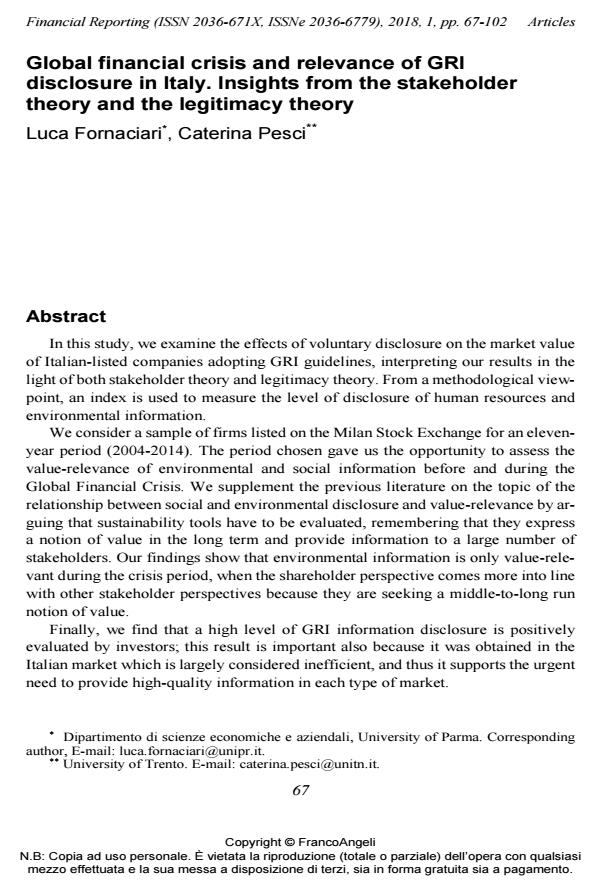Global financial crisis and relevance of GRI disclosure in Italy. Insights from the stakeholder theory and the legitimacy theory
Titolo Rivista FINANCIAL REPORTING
Autori/Curatori Luca Fornaciari, Caterina Pesci
Anno di pubblicazione 2018 Fascicolo 2018/1
Lingua Inglese Numero pagine 36 P. 67-102 Dimensione file 410 KB
DOI 10.3280/FR2018-001003
Il DOI è il codice a barre della proprietà intellettuale: per saperne di più
clicca qui
Qui sotto puoi vedere in anteprima la prima pagina di questo articolo.
Se questo articolo ti interessa, lo puoi acquistare (e scaricare in formato pdf) seguendo le facili indicazioni per acquistare il download credit. Acquista Download Credits per scaricare questo Articolo in formato PDF

FrancoAngeli è membro della Publishers International Linking Association, Inc (PILA)associazione indipendente e non profit per facilitare (attraverso i servizi tecnologici implementati da CrossRef.org) l’accesso degli studiosi ai contenuti digitali nelle pubblicazioni professionali e scientifiche
In this study, we examine the effects of voluntary disclosure on the market value of Italian-listed companies adopting GRI guidelines, interpreting our results in the light of both stakeholder theory and legitimacy theory. From a methodological viewpoint, an index is used to measure the level of disclosure of human resources and environmental information. We consider a sample of firms listed on the Milan Stock Exchange for an eleven-year period (2004-2014). The period chosen gave us the opportunity to assess the value-relevance of environmental and social information before and during the Global Financial Crisis. We supplement the previous literature on the topic of the relationship between social and environmental disclosure and value-relevance by arguing that sustainability tools have to be evaluated, remembering that they express a notion of value in the long term and provide information to a large number of stakeholders. Our findings show that environmental information is only value-relevant during the crisis period, when the shareholder perspective comes more into line with other stakeholder perspectives because they are seeking a middle-to-long run notion of value. Finally, we find that a high level of GRI information disclosure is positively evaluated by investors; this result is important also because it was obtained in the Italian market which is largely considered inefficient, and thus it supports the urgent need to provide high-quality information in each type of market.
Parole chiave:Social and environmental reports, global financial crisis, global reporting initiative guidelines, stakeholder theory, value relevance.
- The level of compliance with the Italian Legislative Decree No. 254/2016 and its determinants: Insights from Italy Valter Cantino, Alain Devalle, Simona Fiandrino, Donatella Busso, in FINANCIAL REPORTING 1/2019 pp.113
DOI: 10.3280/FR2019-001004 - Does the Adoption of Planning and Control Tools Influence Performance? Opinions of Grantors and Grantees About Non-profit Projects Giacomo Boesso, Fabrizio Cerbioni, Andrea Menini, in FINANCIAL REPORTING 2/2022 pp.35
DOI: 10.3280/FR2022-002002 - Accounting, Accountability and Society Caterina Pesci, Luca Fornaciari, Alice Medioli, Silvia Triani, Teerooven Soobaroyen, pp.225 (ISBN:978-3-030-41141-1)
- The assurance of non-financial disclosure: A longitudinal analysis of the academic and professional literature Michele Guidi, Marco Giuliani, Maria Serena Chiucchi, Stefano Marasca, in FINANCIAL REPORTING 2/2021 pp.5
DOI: 10.3280/FR2021-002001 - Circular economy in the food industry. An analysis of Italian-listed companies' sustainability reports Raffaela Nastari, Sabrina Pisano, Matteo Pozzoli, in FINANCIAL REPORTING 1/2025 pp.81
DOI: 10.3280/fr202516707 - The Factors of Integrated Reporting Quality: A Meta-Analysis Madalina Dumitru, Voicu D. Dragomir, in SSRN Electronic Journal /2021
DOI: 10.2139/ssrn.3940094
Luca Fornaciari, Caterina Pesci, Global financial crisis and relevance of GRI disclosure in Italy. Insights from the stakeholder theory and the legitimacy theory in "FINANCIAL REPORTING" 1/2018, pp 67-102, DOI: 10.3280/FR2018-001003